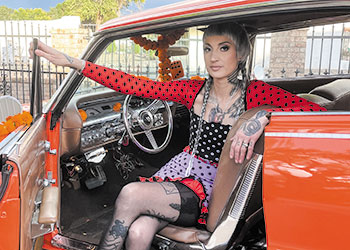From Y La Bamba to Black Belt Eagle Scout, here’s the info on some new queer releases
GREGG SHAPIRO | Q-Music
GreggShapiro@aol.com
The songs on Lucha (Tender Loving Empire) explore “love, queerness, Mexican-American and Chicanx identity, family, intimacy, yearning, loneliness,” says Luz Elena Mendoza Ramos, the lead vocalist of Y La Bamba. This is a tall order for any artist, but Ramos is more than up to the task, singing in Spanish and English.
Like the Black Belt Eagle Scout album reviewed below, Y La Bamba’s Lucha is a product of the pandemic and, as such, feels both raw and healing, as you can hear on “Hues” (featuring Devendra Banhart), “Collapse,” “Nunca,” “Mas Manos,” “Walk Along” and an especially haunting cover of Hank Williams’ “I’m So Lonesome I Could Cry.”
Anyone who has been following queer singer/songwriter Caroline Rose since her independently released 2010 debut album I Will Not Be Afraid through her latest, 2023’s The Art of Forgetting (New West) knows that she’s comfortable slipping in and out of genres. From alternative country on “…Afraid” to modern rock with a healthy dose of humor on 2018’s brilliant “Loner,” from concept pop on 2020’s “Superstar” to musical experimentation, with a heavy helping of heartache, on the break-up album The Art of Forgetting. While this sonic shift might be unsettling to some Rose fans, it’s fair to say she’s a natural — like Taylor Swift — at getting her pointed point across, especially on “Miami,” “Rebirth,” “Everywhere I Go I Bring The Rain,” “Tell Me What You Want,” “Jill Says” and “Where Do I Go From Here?” It’s the musical equivalent of misery loves company.
For his aptly titled new album Anything Goes (604/Warner), Vancouver-based, Juno-nominated queer performer Mathew V is the latest gay male artist to try his hand at flipping the heteronormative switch by singing songs originally sung by women to men. He opens the record with a stunning rendition of “Moon River” that would surely make Audrey Hepburn, Henry Mancini and Johnny Mercer smile “wider than a mile.” “Big Spender” succeeds by being both campy and respectful, and he sounds like he was born to sing Gershwin’s “The Man I Love.”
 Mathew’s take on “Don’t Rain On My Parade” takes on extra meaning with Pride celebrations around the world under threat from conservatives, and his original composition “My Boy” fits perfectly with these Great American Songbook standards.
Mathew’s take on “Don’t Rain On My Parade” takes on extra meaning with Pride celebrations around the world under threat from conservatives, and his original composition “My Boy” fits perfectly with these Great American Songbook standards.
Since the 1990s, Olympia, Wash., has been the source of some of the most groundbreaking queer music in history, made by bands including Bikini Kill, Team Dresch, Sleater-Kinney, Tracy + the Plastics and others. If you haven’t yet had the chance to experience Olympia’s queercore folk-punk outfit Pigeon Pit, led by trans vocalist Lomes Oleander, now is your chance. Tree House (Ernest Jennings), Pigeon Pit’s 2017 six-song acoustic EP, has just been reissued on vinyl. And Pigeon Pit’s new 10-song album Feather River Canyon Blues (Ernest Jennings), on pink and white vinyl, is a more fully-realized band album.
Opening with the Ezra Furman-esque “Love Letters,” the album alternates between a kind of Furman fury (“Milk Crates,” “Empties”), glorious queer folk (“River Song,” “Fire Escape,” “Sunbleached”) and twinkling twang (“Clawfoot,” “Soup For My Family”).
For the longest time, the jazz genre had a reputation for being unwelcoming to LGBTQ+ folks. However, in recent years, out jazz artists — including Allison Miller, Fred Hersch, Terri Lyne Carrington, Patricia Barber, Andy Bey, Gary Burton, Lea DeLaria and Dave Koz — have been making a difference by being their true selves. We can now add newly out jazz pianist Eric Reed to the growing list.
His new album, Black, Brown, and Blue (Smoke Sessions), featuring the original title track composition — as well as interpretations of songs by Thelonious Monk (“Ugly Beauty”), Wayne Shorter (“Infant Eyes”), Duke Ellington (“I Got it Bad”), Bill Withers (“Lean on Me”), Stevie Wonder (“Pastime Paradise”), Horace Silver (“Peace”) and McCoy Tyner (“Search For Peace”) — is said to be a kind of narrative of his coming out.
Portland-based Black Belt Eagle Scout (aka Katherine Paul), who describes herself as a “radical indigenous queer feminist,” has only released three full-length studio albums. But she sounds so accomplished, you’d think she’d had a much longer recording career under her, well, black belt.
The title of her new album — The Land, The Water, The Sky, (Saddle Creek) — refers to her returning to the Swinomish Indian Tribal Community (on Washington’s Puget Sound) of her ancestors during the pandemic. Opening with the kind of guitar gut punch that feels very Pacific Northwest, she sings “I know it’s hard to be here” on “My Blood Runs Through This Land,” indicating to listeners that this won’t be an easy experience. And yet, a kind of détente is achieved over the course of the 12 songs, the best of which include “Fancy Dance,” “Nobody,” “Blue,” “Treeline” and “Don’t Give Up.”













